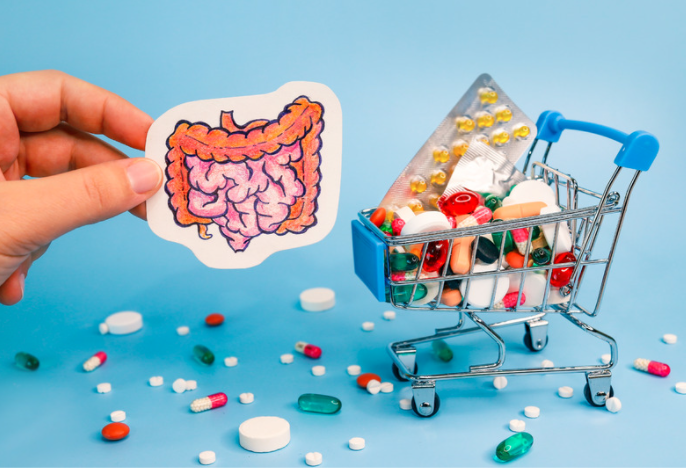Have you ever “trusted your gut” or felt “butterflies” in your stomach? You may have wondered where these expressions come from. The rationale behind is that the gastrointestinal tract is sensitive to emotions. Anger, anxiety, sadness can all trigger and be triggered by symptoms in the gut.
Most of us have heard the term “gut health” and know that keeping it in good standing is desirable. Your gut is home to microbes and bacteria that play a crucial role in your overall well-being and even your mental health. It turns out that stomach issues cause a lot more than just physical discomfort. So, how does gut health impact our emotions?
Meditsimple has partnered with the brand new Gastroenterology department of the Kensington International Clinic to answer this question and discuss the steps we can take to preserve your mental health through a healthy microbiome.
Microbiome or the Life Inside our intestines
Essentially, gut microbiome refers specifically to the microorganisms living in our intestines. Scientists estimate that roughly 100,000 billion microbes live in our digestive tract (this is 5,000 times the world population!). While some microorganisms are harmful to our health, many are incredibly beneficial and even necessary to a healthy body.
Every gut microbiome is unique: the type of bacteria varies significantly from one individual to another.
The microbiome is acquired at birth and evolves continuously as we age. Babies get their first big exposure to microbes at birth, while traveling through the birth canal, then pick up more while breastfeeding. Breast milk doesn’t feed just the baby, it also feeds the baby’s microbiome. It contains the exact nutrients a baby needs—and the right bacteria, too. These bacteria jump start the baby’s immune system and digestive system, help prevent infection and even shape brain development.
Altogether, these microbes may weigh as much as 1 to 2 kg, which is roughly the weight of your brain.
So why should I listen to my gut health?
Here is the bad news: the convenience of our modern lifestyle often comes with a heavy toll on our health. High stress levels at work or in school, too little sleep, a nutrition based mostly on processed and industrialised food, can damage the human microbiota. An unstable microbiota is sadly synonymous with diseases down the road. A plethora of conditions, from obesity to anxiety, appear to be linked to the microbes inside our intestines.
Listen to your second brain!
When you are nervous, you are getting signals from your second brain hidden in the walls of the digestive system: the “brain in your gut”. This second brain exerts a powerful influence over the one in your skull. Scientists call it the enteric nervous system (ENS). Our two brains talk to each other, which explains why we feel nauseated before giving a presentation, or during stressful times.
This is a two-way street!
The gut-brain connection goes both ways. The brain in your skull can also exert a powerful influence on your intestinal bacteria. In other words, even mild stress can challenge the microbial balance, making you more vulnerable to infectious disease. For example, thinking about food can release the stomach’s juices before food gets there. Therefore, a person’s stomach or intestinal distress can be the cause or the product of anxiety, or depression.
How does your gut brain influence your mental health?
The gut microbiome can influence neural development, brain chemistry, your emotions, pain perception and how the stress system responds.
Gut bacteria produce hundreds of neurochemicals that the brain uses to regulate basic physiological and mental processes such as learning, memory and mood. For example, gut bacteria manufacture 95% of the body’s supply of serotonin, which influences both mood and gastrointestinal activity.
Your gut and brain are connected by the vagus nerve which enables you to breathe, digest food, and allow communication between the two organs. The gut-brain axis is becoming a vital player in mental health, and explains why stress can take a toll on your digestion.
But when the vagus nerve is impaired by stress (that directs energy and attention to your muscles and brain) and your microbiome not balanced (dysbiosis), opportunistic microbes can take advantage and proliferate. This will trigger a reaction from your immune system and ultimately result in inflammation. This irritation in the gastrointestinal system may send signals to the central nervous system (CNS) that trigger mood changes.
Don’t worry, MeditSimple has your back!
Know more with the Centre of Excellence for Digestive Health
What to do to keep your microbiome in good shape?
The key to happier hormones (so happier mood!) and better stress resilience is maintaining a diverse and balanced microbiome.To get an analysis of your microbiome, La Maison Medicale offers 3 different packages of tests. They all include a questionnaire, medical consultation, and stool analysis. The results are delivered in a comprehensive medical report, followed by another consultation to discuss prescriptions and personalised micronutrition advices.
Book an appointment with one of their Health Professionals today!
Our experts from the Centre of Excellence for Gastroenterology propose a multifaceted approach to manage gastrointestinal pains that involves rebalancing the gut microbiome through diet, probiotics, and specific lifestyle changes. Their treatment plan is carefully tailored to every patient’s needs. Their objective is to cultivate this inner ecosystem in ways that could prevent- and possibly treat- anxiety and changing moods.
Specifically, they call for:
- A healthy diet of fruits and vegetables. Diet plays a crucial role in shaping the gut ecosystem, to increase the abundance of diverse microbes, reduce inflammation, and ultimately lower your stress!
- Prebiotics are a type of fiber on which useful microbes can thrive. Foods rich in prebiotic include artichokes, bananas, asparagus, oats and apples. Prebiotics transform gut bacteria into good things like SCFAs and vitamins. For example, butyrate prevents inflammation and even helps you grow new brain cells. You can actively contribute to the butyrate production in your gut through your diet!
- Probiotic bacteria naturally reside in the gut but are also found in supplements and fermented foods, like yoghurt and kefir. They reseed the gut with healthy microbes. Studies showed that Lactobacillus species could alleviate symptoms of depression.
- Lifestyle habits, including exercise, sleep and stress reduction.
Gut microbes regulate happy hormones
Your gut microbes transform food into short-chain fatty acids. Well, these SCFAs communicate with cells which produce serotonin, a hormone that regulates your mood, as well as levels of anxiety and happiness. Basically, your gut microbes stimulate serotonin production, to help calm the nervous system and switch off stress reactions.
Fundamentally, your diet can help your bacteria protect your mental wellbeing because eating the right foods feeds happy bacteria. This means a more diverse microbiome that produces mood-lifting chemicals!
What next?
So there’s a chance that your stomach or intestinal problems such as heartburn, abdominal cramps, or loose stools, are related to stress. Watch for these and other common symptoms of stress and discuss them with your doctor. Together you can come up with strategies to help you deal with the stressors in your life, and also ease your digestive discomforts.
 Your gut microbiome is the foundation of your health. Depending on the strain, you can make these bacteria a friend or foe to your body. Learn how to preserve it, and explore our Centre of Excellence for Gastroenterology today !
Your gut microbiome is the foundation of your health. Depending on the strain, you can make these bacteria a friend or foe to your body. Learn how to preserve it, and explore our Centre of Excellence for Gastroenterology today !
Centre of Excellence for Gastroenterology
REFERENCES
Harvard Health Publishing (2021). The gut-brain connection:Pay attention to your gut-brain connection – it may contribute to your anxiety and digestion problems
John Hopkins Medicine. The Brain-Gut Connection
Atlas Biomed (2020). 9 Ways Gut Bacteria And Mental Health, Probiotics And Depression Are Linked
Carpenter, S. in The American Psychological Association (2012). That gut feeling





